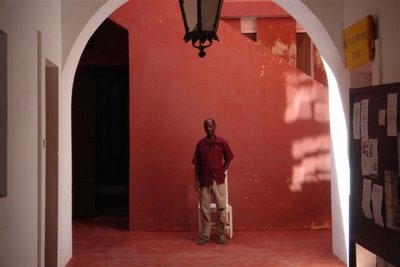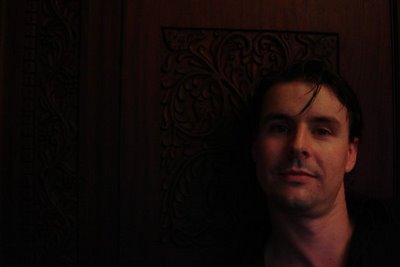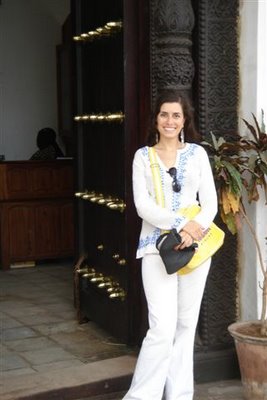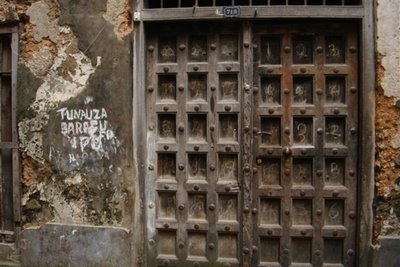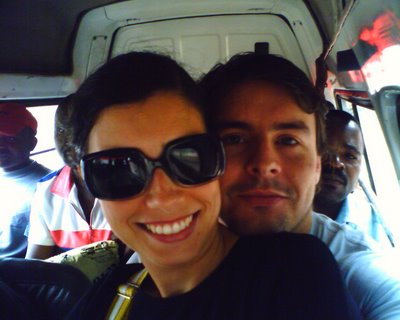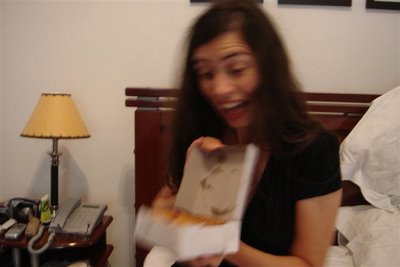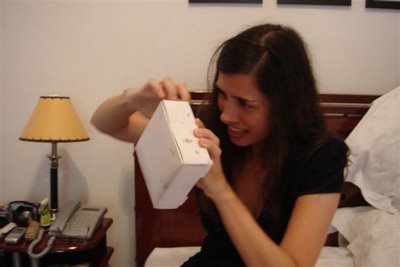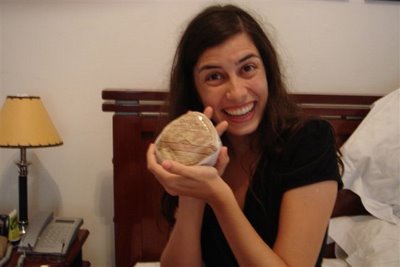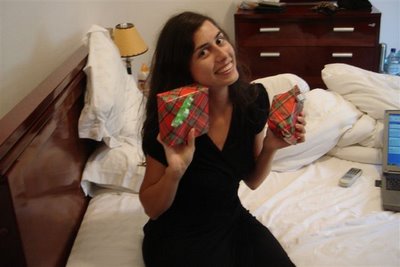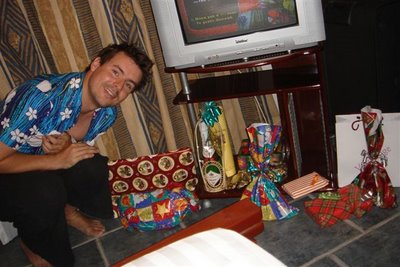Monday, April 02, 2007
Sunday, April 01, 2007
Saturday, January 20, 2007
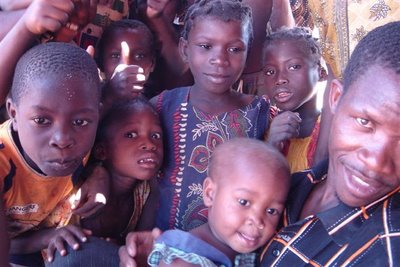 Our nightguard Antonio with his children at his house in Makoni, near Ponta Fugo, where cars don't reach.
Our nightguard Antonio with his children at his house in Makoni, near Ponta Fugo, where cars don't reach. Antonio on his elaborate bed. Did he cycle with that on the back all the way from civilisation? Probably.
Antonio on his elaborate bed. Did he cycle with that on the back all the way from civilisation? Probably.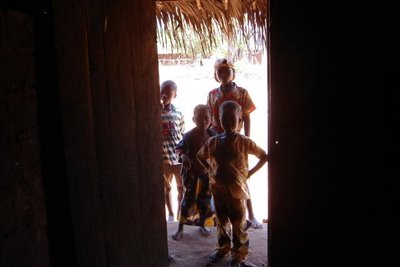
When we got back from Zanzibar, we began preparation for the Investor enquiry we received out of the blue. They wanted our top 4 recommendations for unexplored beaches in our area. We researched the pretty village of Lunga, from which I saw a lovely looking beach across the bay. It turned out to be the home of our nightguard Antonio, from where he cycles for hours to reach us. He was delighted we were interested in coming. To get there, we took the 4x4 down a path for walkers only, clearly no cars had been there. Antonio told me last night, that when his son sees a car now he says, 'Is that Sr Rory's car?'.
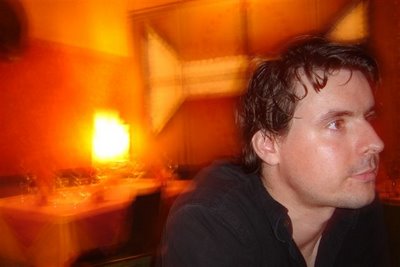 In some bar.
In some bar. This is the door to the only untouristy place we found in Zanzibar. In truth, we didn't really like Zanzibar. The hassle handed out to tourists from the port in Dar to the spice sellers in the streets on the island, it was cynical, aggressive and very persistent and made walking down the road like running the gauntlet. But this restaurant was sweet and was a stronghold of veiled women. It had one dish, these little meat kebabs with a mystery spicy sauce, it was gorgeous and to our surprise didn't wreck our intestine.
This is the door to the only untouristy place we found in Zanzibar. In truth, we didn't really like Zanzibar. The hassle handed out to tourists from the port in Dar to the spice sellers in the streets on the island, it was cynical, aggressive and very persistent and made walking down the road like running the gauntlet. But this restaurant was sweet and was a stronghold of veiled women. It had one dish, these little meat kebabs with a mystery spicy sauce, it was gorgeous and to our surprise didn't wreck our intestine.
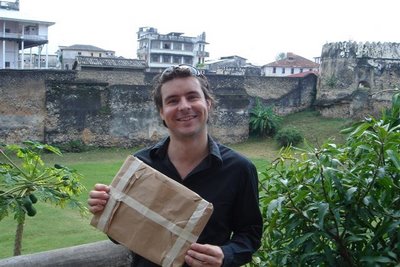 I bought my sister Camilla a picture of a Zanzibari door in the artshop inside the fort.
I bought my sister Camilla a picture of a Zanzibari door in the artshop inside the fort. Their fort is conspicuously not European like Ilha's fort. It seems to have more in common with Maputo's which is way past Ilha, 6 hours flying south.
Their fort is conspicuously not European like Ilha's fort. It seems to have more in common with Maputo's which is way past Ilha, 6 hours flying south.
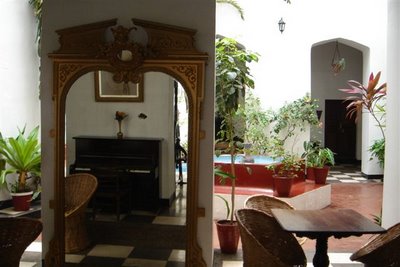 Zanzibari style seems to ramble and go off on tangents like a walk through a very interesting attic. Years of trade and cultural exchange between Europe, Asia and Africa means Chinese, Indian and British influences combine.
Zanzibari style seems to ramble and go off on tangents like a walk through a very interesting attic. Years of trade and cultural exchange between Europe, Asia and Africa means Chinese, Indian and British influences combine.
 It's early November '06 and we headed to Zanzibar to see how they had converted a similar impoverished trade post on the East Africa spice route into a renowned tourism destination. We got a chance to relax of course. This is a restaurant on top of the Emerson and Green hotel. The tiny rooftop holds 30 guests, who sit on cushions in a circle and are fed and serenaded.
It's early November '06 and we headed to Zanzibar to see how they had converted a similar impoverished trade post on the East Africa spice route into a renowned tourism destination. We got a chance to relax of course. This is a restaurant on top of the Emerson and Green hotel. The tiny rooftop holds 30 guests, who sit on cushions in a circle and are fed and serenaded.
This just about sums up the way Joana and I spent hours of time. Bouncing over potholes with Jaime at the wheel, braced in the back of a car with no air conditioning, peanut shells under the brake pedal, Brazilian rap on the stereo. A day at the office!
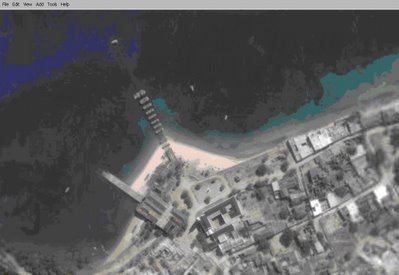
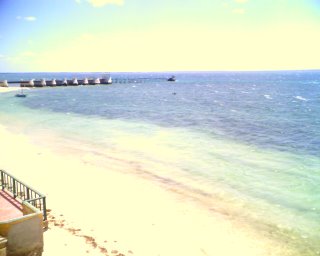
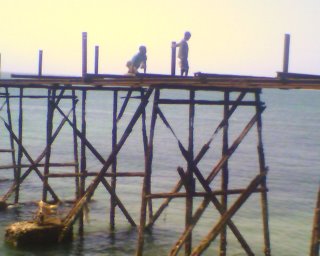
This is the old jetty on Ilha, which used to be the grandest entrance, welcoming all Ilha's produce and seafarers, leading them up to the Governor's palace and square. Now boys encourage you along the lace-thin, perilous metal joists to the storehouse at the very end, a vantage point for the view Ilha visitors saw upon arrival.
Tuesday, December 26, 2006
 This is the day at the end of October when Joana and I met our first KING! Regulo Abdul is in the middle, king of Matibane. He was very modest. We asked how to get in touch with him if we wanted to ring, and he revealed he didn't have a phone, and we should drive to Matibane again if we wanted to talk to him.
This is the day at the end of October when Joana and I met our first KING! Regulo Abdul is in the middle, king of Matibane. He was very modest. We asked how to get in touch with him if we wanted to ring, and he revealed he didn't have a phone, and we should drive to Matibane again if we wanted to talk to him.On the left is Bernardo Mualeite, an extremely enthusiastic functionary of the Nampula provincial government in tourism. He is still dying to take us around Mecuburi National Park.
And behind all three you can see Jaime, trying to get into the picture.
 That's our house in white in the background. The mast is a tree.
That's our house in white in the background. The mast is a tree. We took a dhow to Matibane just for fun, with the cast of characters above. They were curious to have us at their mercy, and giggled at the bolder ones asking us for a sip of water and for their photo to be taken. I'll add movies for this.
We took a dhow to Matibane just for fun, with the cast of characters above. They were curious to have us at their mercy, and giggled at the bolder ones asking us for a sip of water and for their photo to be taken. I'll add movies for this.
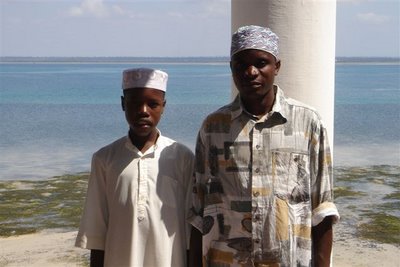
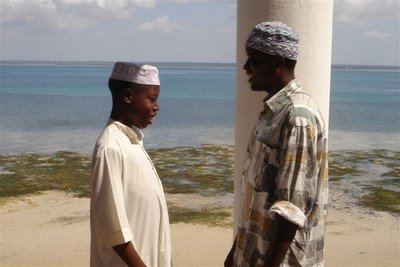 This is Amade demonstrating a boy dressed for 'Id'. The final day of Ramadan is marked with a celebration on Ilha, in which all the children process in Id dress around Ilha. The little boys wear ties, the girls wear beads. Amade was delighted to drag this boy in from the street for photos. After a posed one to camera, I suggested they tried a casual, informal pose, chatting. So they stiffly turned to one another, as pictured, and Amade said 'Errr. Today is Id,' and the boy said 'Yes.'
This is Amade demonstrating a boy dressed for 'Id'. The final day of Ramadan is marked with a celebration on Ilha, in which all the children process in Id dress around Ilha. The little boys wear ties, the girls wear beads. Amade was delighted to drag this boy in from the street for photos. After a posed one to camera, I suggested they tried a casual, informal pose, chatting. So they stiffly turned to one another, as pictured, and Amade said 'Errr. Today is Id,' and the boy said 'Yes.'
 FECALISED!! Sorry - it's part of the Ilha experience. Fecalismo is the first 'social problem' everyone who knows anything will bring up when you discuss Ilha's tourism potential. The lack of sanitation is being addressed now by Swiss Coop and Millennium Challenge Commission.
FECALISED!! Sorry - it's part of the Ilha experience. Fecalismo is the first 'social problem' everyone who knows anything will bring up when you discuss Ilha's tourism potential. The lack of sanitation is being addressed now by Swiss Coop and Millennium Challenge Commission.JOANA WROTE: I object to this picture Rory!! It's disgusting, and there's no need to gross out our friends and family. Apologies to all, I couldn't quite enforce censorship on this blog...
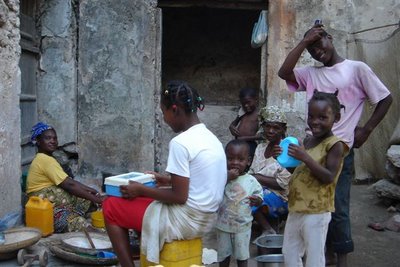
This is Muarapo (pink t shirt) and his family. They live beside the main square with bandstand, visible on Google Earth. Their house is very ruined and this room has no roof at all. Muarapo buys fish from the fishermen and sells in the market, thus earning the money for everyone you see, his dad lives and works 2 hours away in Nacala. I've been trying to get him to save money, open a bank account etc, but only really succeeded in lending him the equivalent of £4, with a fish every so often as interest.
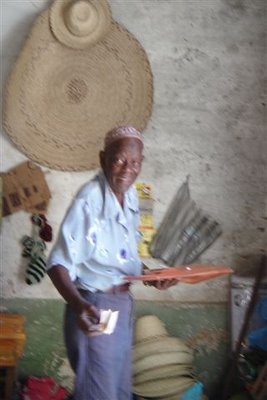

There are a few Ilha residents whose features suggest non Bantu African ('black' African) genetics. They sometimes show Arabic or Portuguese/European genes. The man in charge of the barrier to the bridge, the lady who owns O Paladar restaurant, the tailor's chum from earlier in the blog, the lady running the tiny convenience store in the colonnade are examples, as well as this shopkeeper in the hardware shop in stone town south of the main mosque, where I bought a grill for our charcoal barbecue.
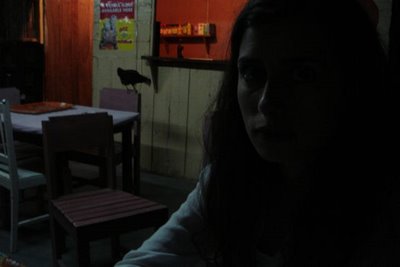 We are inside a bar we like on Ilha, beside the old hospital. It is a converted container, and the lady proprietor is unfazed by the hoards of children, sleeping drunks, TV watchers, diners, furious wives who pass through the door. There is also a chicken who lives there unchallenged, who can be seen over Joana's shoulder here. When the chicken decided to flutter up and settle on the back of Joana's chair, there was a brief but intense skirmish for supremacy, which Joana eventually won...
We are inside a bar we like on Ilha, beside the old hospital. It is a converted container, and the lady proprietor is unfazed by the hoards of children, sleeping drunks, TV watchers, diners, furious wives who pass through the door. There is also a chicken who lives there unchallenged, who can be seen over Joana's shoulder here. When the chicken decided to flutter up and settle on the back of Joana's chair, there was a brief but intense skirmish for supremacy, which Joana eventually won...In this bar, you can ask the lady to feed you, and you'll get an excellent plate of whatever she's prepared for the evening. Often a fish stew with sundried mango and coconut sauce, always gorgeous.
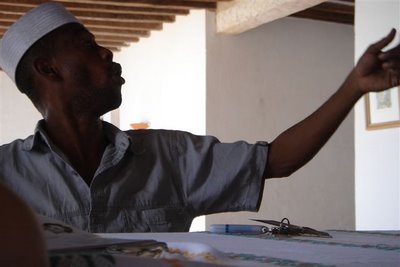

 Hafiz Jamu visited us. He is the chief of one of Ilha district's confrarias, or muslim brotherhoods and is extremely charismatic, young and dynamic, and keen to work with NGOs to improve the prosperity of Ilha. You can see him on our film (link on post of Dec 10th).
Hafiz Jamu visited us. He is the chief of one of Ilha district's confrarias, or muslim brotherhoods and is extremely charismatic, young and dynamic, and keen to work with NGOs to improve the prosperity of Ilha. You can see him on our film (link on post of Dec 10th).
Antoine, on the right, is the linchpin of our project on Ilha. He befriended Jake, Luis Filipe, Luis Bernardo and Heinrich all separately, who are, head of TechnoServe, revered Mozambican historian, ex Minister of Culture and published author, and international investor and Ilha lover. They now all form our steering committee.
Here Hafiz discusses with Antoine the dispute over those behind the Ilha cultural festival, to hold it during Ramadan, thus giving Ilha islanders the choice of drinking alcohol at the festival and break Ramadan's rules of deprivation, or miss the festival.

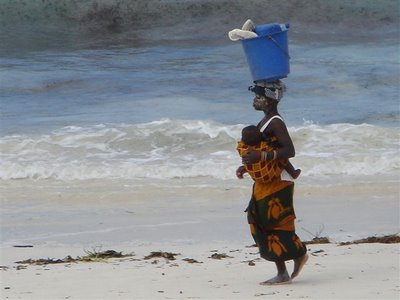 Returning to the sketchy linear timeline, we're back on Cabaceira beach with Joana's parents, Antonio and Fernanda. While we were on the beach, a boatload of fisherwomen carrying seafood must have disembarked further down the coast, and there was stampede of them racing to be first to market. They didn't even stop to try and sell.
Returning to the sketchy linear timeline, we're back on Cabaceira beach with Joana's parents, Antonio and Fernanda. While we were on the beach, a boatload of fisherwomen carrying seafood must have disembarked further down the coast, and there was stampede of them racing to be first to market. They didn't even stop to try and sell.







.JPG)
.JPG)
